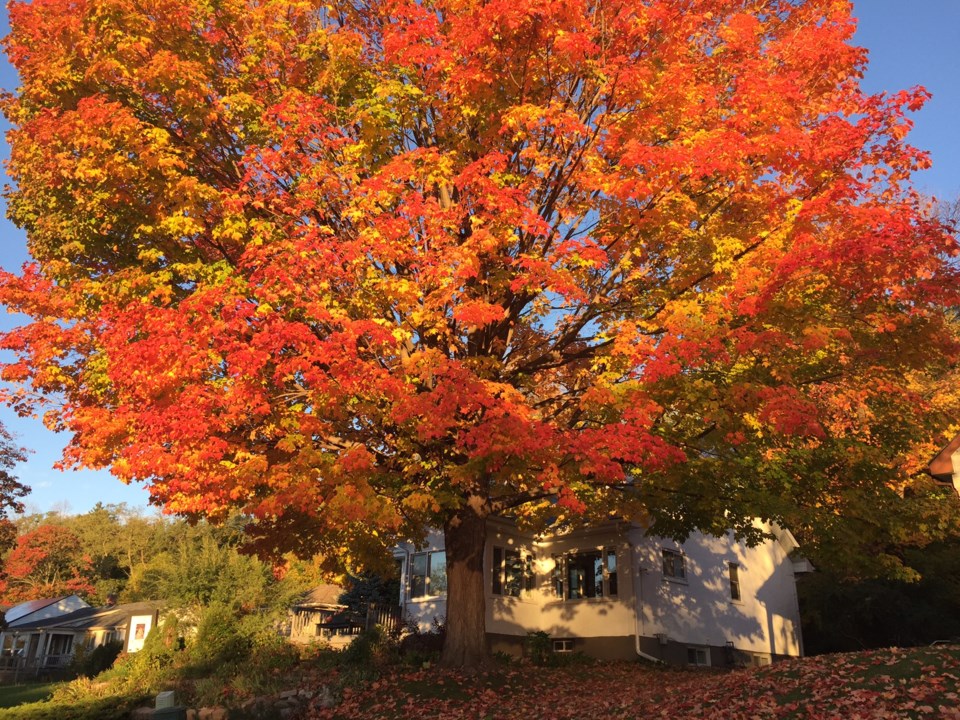City council has axed a consultant’s investigation into protecting single, private trees in Barrie.
It was replaced Monday night with a public, online survey early next year.
“The new direction allows staff to look at a first phase, being the public consultation through online platforms that exist to get feedback on bylaw options,” said Coun. Ann-Marie Kungl, who proposed the change.
“I think we’ve struck a balance here of utilizing city resources effectively to start this process and, more importantly, most important, to engage our community in understanding the scope of this issue and the opportunities that could be presented,” said Coun. Jim Harris, who seconded the motion.
The original motion was to include $50,000 in next year’s proposed budget, to conduct a cost-benefit analysis associated with individual (single) tree bylaws to mitigate future damage of privately owned trees due to private construction and excavation projects and report back.
This investigation was to include: individual heritage trees, an evaluation of best practices from other municipalities, the potential for a more comprehensive approach to mature tree protection beyond excavation and construction, and a public and stakeholder consultation process.
Operating and capital funding would have been required, based on the level of regulation proposed. Estimated costs for alternatives presented ranged from $125,000 to $600,000 annually, including staff and enforcement.
It was replaced with a motion that deleted the original motion, replacing it with city staff conducting public consultations through online platforms, such as a survey, to obtain public feedback on private trees bylaw options in the first quarter of 2022. That staff report would then come back to the city building committee early in the second quarter of 2022 with the results of the public consultation.
“I think we came to a really solid middle ground,” said Coun. Mike McCann, who balked at both the $600,000 upper cost limit and the $50,000 for a consultant at last week’s meeting.
Coun. Sergio Morales had a different concern.
“This is the kind of survey that’s going to get input from people that want to support it,” he said. “This is something they’re going to be following, and passionate, so… I’m going to be interested to see the data, but I take it with a grain of salt. This one is very niche and targeted.”
Cathy Colebatch of the Allandale Neighbourhood Association, who got wind of the amendment, made a deputation before the motion was changed and said she was not surprised a consultant would cost $50,000.
“Has the city ever completed a comprehensive review as it applies to a private trees bylaw?” she asked. “If we do not have resources to complete comprehensive reviews on any topic… these are the costs associated. It is not like we haven’t spent and continue to spend money on consultants.”
Colebatch mentioned reviews of the Official Plan and comprehensive zoning bylaw as examples of consultant spending.
“This is the cost of doing business unless you increase permanent staffing resources,” she told council. “Lack of resources is not a reason to continue down the road of status quo and do nothing when it comes to our environment, climate change, residents’ health and well-being, and keeping our mature tree canopy intact. No one wants to live in a cement city.”
But Kungl said it works for her.
“I think it (the change) gets to the true intention and allows important work to continue without requesting an intake form (for spending at budget time) or dollars associated at this time,” she said. “Staff can now first look at engaging in some work without needing external consultants to support.
“We can then look at the information from the survey and create still a process for the public to shape next steps.”
Ontario’s Municipal Act gives local governments the authority to prohibit or regulate the destruction or injuring of trees.
Since 1990, all trees on private property that are within an ecological woodlot of half an acre or more have been protected under the provisions of a private tree bylaw, which prohibits or regulates the injuring or destruction of trees on private property in Barrie.
Annually, city staff issue three to five tree-removal permits for subdivision or site-plan developments, two to three permits for single lot construction works, such as pool installation or additions, and one permit for woodlot management, such as thinning or harvesting.
Staff also deny one to two permit application requests annually — for clearing forest without having an approved site plan, subdivision or other approved development plans in place.
While occurring infrequently, city staff have investigated and charged landowners for violating the private tree bylaw with resulting fines and restoration orders issued. Most incidents result in voluntary restoration and replanting by the landowner, however some cases must be resolved in courts. Court cases have resulted in a range from negotiated settlements to fines up to $70,000, and restoration orders of as much as $64,000.
So-called heritage trees are protected under the tree preservation bylaw, those formally designated by city council as being unique and of importance to Barrie in terms of distinctive form, size, age and/or historical significance.
Barrie has approximately 24,865 acres of total area, which is covered in about 7,573 acres of tree canopy; about 71 per cent of the tree canopy is on private land, 29 per cent on public land.
The tree canopy on residential, single-detached dwelling properties accounts for approximately 1,356 acres or about 18 per cent of the total tree canopy within Barrie.



